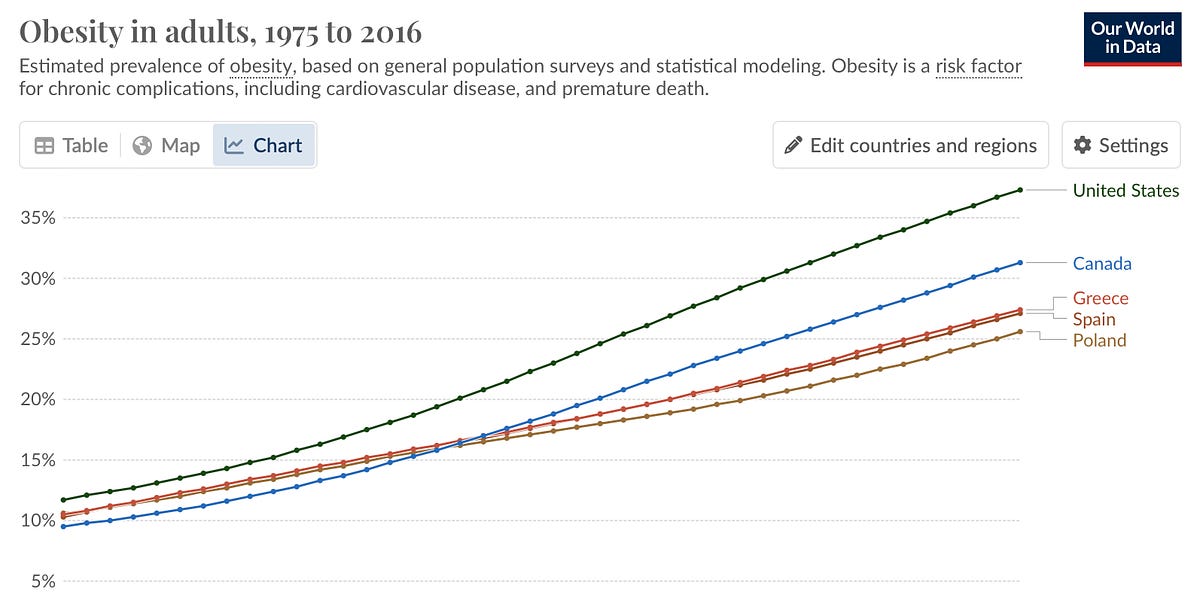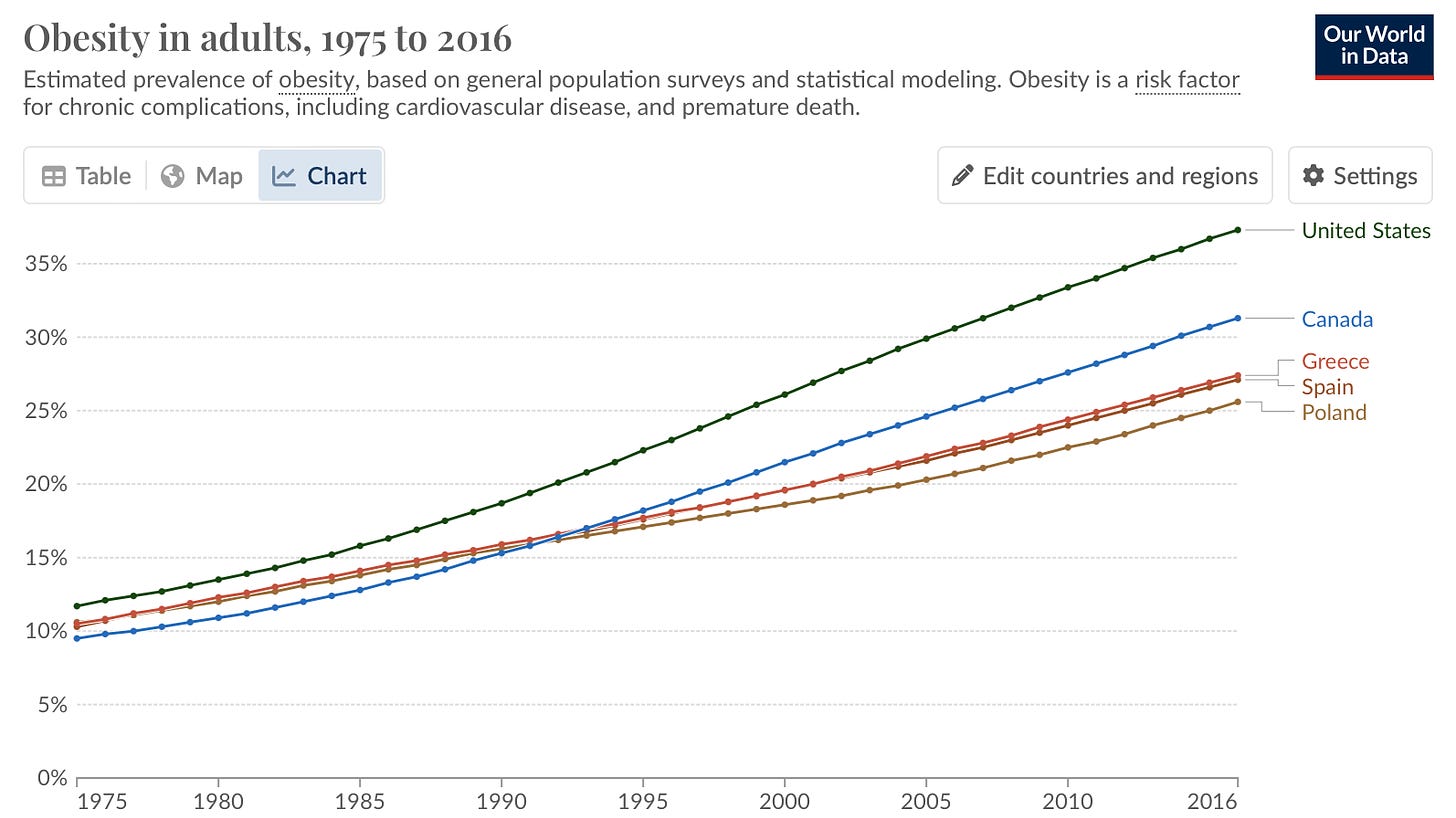Happy Juneteenth!
It’s a federal holiday, which means no full-length post. But there was a question in last week’s poll that I personally thought was interesting, so even though it wasn’t the winner, I’m going to share a bonus answer here today.
Charles Ryder: You wrote a piece a while back regarding the relationship between the ever-decreasing cost of food, and obesity. I found this pretty intuitive, and I’ve generally come to view the theory as the most likely explanation for weight gain on epidemiological scales. But I’ve noticed lately in the obesity discourse there’s been a very noticeable takeover of the role allegedly played by “ultraprocessed” foods. In your view are ultraprocessed foods merely the latest in a long line of alleged explanations for the obesity epidemic (perhaps akin to carbs in the 90s, or fat in the 80s), or is there something there?
I’m not going to try to debate the details of nutrition science with anyone, but to me, this is an example of situation that often arises where people are debating the wrong level of explanation.
Back when I was a smoker, I smoked Camel Light. So you could have done a detailed analysis of my lungs and concluded that 98 percent of the damage to Matt’s lungs is done by Camel Lights, so if we just ban Camel Lights, he’ll be fine. And I suppose that might work. But it’s much more likely that I’d have switched to Marlboro Lights or some other brand. The claim that most of the damage was done by Camel Lights wasn’t wrong, but it was explaining the wrong thing. What’s the right thing to explain? Well, that depends to an extent on what you’re interested in. Maybe you want to know why cigarettes are addictive. Or maybe you want to know why nicotine, which is the addictive thing in cigarettes, is addictive. Or maybe you want to know about the social determinants of youth initiation into smoking. Or maybe you want to know why, conditional on initiation into smoking, some people become addicts and others don’t.
In terms of obesity, a lot of people have a sense of this as a problem that took off rather suddenly in the past 30 to 40 years, so they’re doing a detective-type explanation. What happened that led to the obesity takeoff?
What I argued in my previous post is that Americans have been gaining weight for as far back as we have records, back into the 19th century. For most of this history, weight gain manifested itself primarily in terms of people getting taller and the country experiencing lower rates of malnutrition. Eventually, though, we started hitting some kind of biological limits to increased stature, and the steadily rising average BMI manifested as a rapid increase in the number of people above the largely arbitrary obesity threshold.
The upshot of all of this is that rather than being detectives who try to investigate the culprit for the obesity explosion, we should understand the human animal as having evolved to overeat a modest amount whenever food is widely available in order to hedge against starvation risk in the future. Contemporary Americans just face very low objective levels of starvation risk. In “Little Women,” the March sisters walk over to Mrs. Hummel’s house and donate their Christmas dinner to her and her starving children. Today, 120 years later, an American is much more likely to be homeless than to starve, because food has become dramatically more plentiful and we’ve induced a lot of arbitrary housing scarcity.
But food is not only widely available enough that people are rarely starving, they are also frequently faced with food between mealtimes.
You’re at a movie, so you have some movie snacks. It’s the last day of school, so you take the kids to get ice cream. It’s someone’s birthday, so you have a cupcake. You’re up late watching the NBA finals so you have some chips. You’re up late working the next day and you have some chips leftover from the finals yesterday, so you have some more chips. If you’re hosting people for dinner, you’re expected to provide more food than is strictly necessary. And given that the food has been provided, at least some of your guests will overindulge.
Both the evolutionary mechanism behind the instinct to overeat and the evolution of the social tradition that links provision of unnecessary food with the concept of hospitality seem pretty obvious to me. And I think those are pretty clearly the “deep” structural explanations for why people are getting fatter everywhere as the world gets richer, and why richer countries are fatter than less-rich ones. Note in particular that for all the “Mediterranean Diet” hype, Greece and Spain are fatter than Poland. Nobody tries to launch a “Polish Diet” fad because most people don’t like Polish food very much. But for precisely that reason, I think most Americans would lose weight if they had to subsist on stuffed cabbage and flaki.
So, yes, in practice, lots of the excessive snacking that people do consists of “ultra-processed” food. But I think this is a kind of shallow explanation — if nobody could ever eat “ultra-processed” food but everything else was the same, they would overeat something else. The basic facts of human biology, human society, and market incentives would still be there.
I feel really confident that when the keto diet first launched, people who followed it succeeded in losing weight. So much of the food you encounter in daily life is not keto-compliant, there’d be no real way to stay keto without eating less and losing weight. But today, the supermarket is full of keto snacks and restaurant chains are including keto-compliant dishes. Because at the end of the day, the human proclivity for overeating is a business opportunity. People are going to try to sell you tasty food, and you’re going to want to eat a bit more tasty food than you really need to, and you’re going to want to do that each and every day of your life. Some people seem to suffer less from this compulsion than others, or else have a better handle on it. But most people are at least somewhat prey to it, and I don’t think there’s any One Weird Diet Trick that stops it.
What you do see with the current boom in GLP-1 agonists is that there is, in fact, also a business opportunity in “sell me something that will make me less inclined to eat lots of food.” Our evolutionary instinct to overeat is maladaptive to modern society, and most of us would like to not have it.



